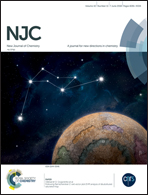Improving the stability and reusability of dextranase by immobilization on polyethylenimine modified magnetic particles†
Abstract
Dextranase is a unique biocatalyst for the enzymatic hydrolysis of dextran in carbohydrate chemistry, but the instability and poor recycling ability of dextranase significantly limit its long-term applications. As an alternative method, stabilization of dextranase on a solid carrier is a promising strategy. In this study, a kind of polyethylenimine (PEI) polymer modified magnetic particle was fabricated and employed as the substrate for covalent immobilization of dextranase (Fe3O4@SiO2-PEI-dextranase) to improve the stability and reusability performance for the first time. The grafted PEI polymer on the surface enhanced the amount of primary amine groups, and improved the loading capacity of dextranase on Fe3O4@SiO2-PEI-dextranase to 217.2 mg g−1, which was 3.84 times that measured on Fe3O4@SiO2-NH2-dextranase particles. Under the optimized conditions, high immobilization efficiency (72.38%) and enzymatic activity (82.84%) of Fe3O4@SiO2-PEI-dextranase were achieved. Thermal and pH tolerance, and long-term storage tests revealed that the Fe3O4@SiO2-PEI-dextranase exhibited much better stabilities. More importantly, Fe3O4@SiO2-PEI-dextranase retained 83.26% of its initial activity after reuse 15 times, suggesting its excellent reusability. It is believed that the immobilized dextranase could have potential applications in biological and biocatalytic fields.



 Please wait while we load your content...
Please wait while we load your content...